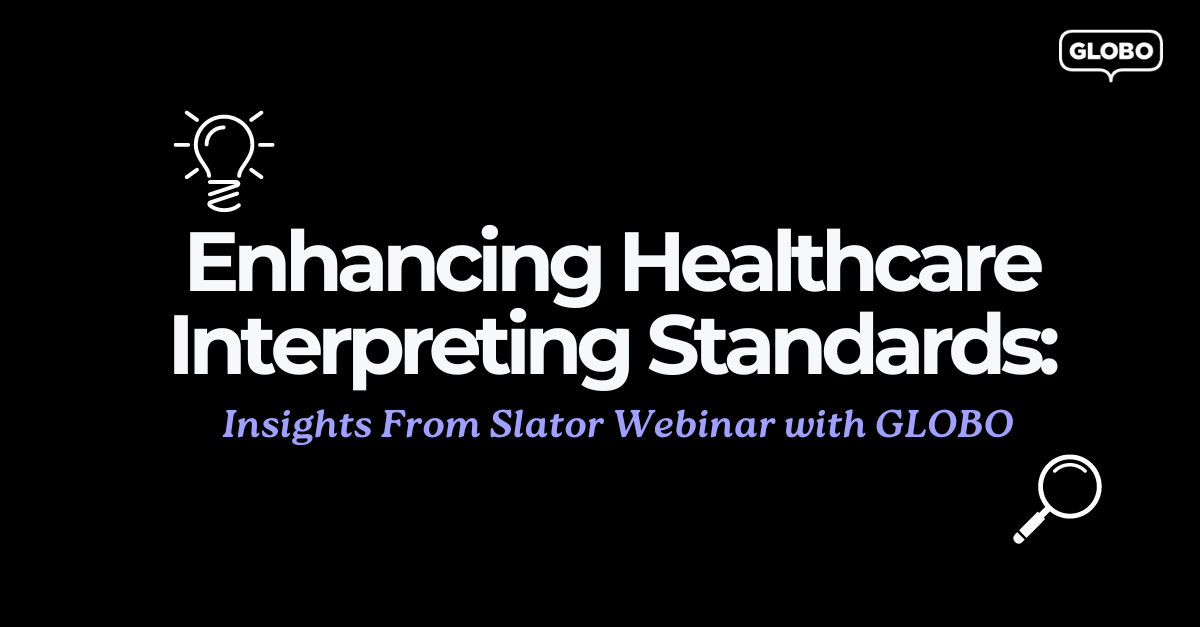Stay up to date.
Stay connected with tips, resources & stories on language access.

In the fast-evolving landscape of healthcare interpreting, ensuring high-quality language access remains a cornerstone for effective patient care. Recently, Slator hosted an illuminating webinar, “Quality Standards in Healthcare Interpreting: A Crucial Opportunity for Improving Language Access Now.” This recap delves into key insights shared by industry leaders from GLOBO, highlighting their perspectives on current challenges, advancements, and the role of AI in shaping the future of healthcare interpreting.
The webinar brought thought leaders to explore the pressing need for standardized healthcare interpreting practices. With Florian Faes as the moderator, the panelists included:
The webinar explored the current landscape of quality assurance in healthcare interpreting. Johanna Parker highlighted the existing national certification programs, such as CCHI and NBCMI, which are pivotal in standardizing interpreting qualifications across the industry. She emphasized the importance of these certifications in ensuring that interpreters meet stringent standards of competence and professionalism, which are critical for effective communication in healthcare settings.
Despite the progress being made, the panel acknowledged several limitations in the current standards. These include the availability of interpreters for less common language pairs, the lack of specialized certifications (such as mental health interpreting), and the ongoing evolution of AI-enabled interpretation. Christina Cordero discussed accreditation standards that guide hospitals in defining interpreter qualifications, underscoring the need for broader, more specialized certifications to address diverse patient needs comprehensively.
Dipak Patel emphasized,
AI can enhance interpreter and physician effectiveness, but human expertise remains irreplaceable."
This highlights the delicate balance between technological advancements and the enduring value of human interaction in healthcare contexts. Panelists also addressed buyer expectations regarding healthcare interpreting services, highlighting the importance of ethical standards, protocol adherence, and professional behavior among interpreters. Johanna Parker reminded attendees, "You don’t want a patient to get great language access at a specialty hospital and then struggle at their community clinic."
A significant portion of the webinar was dedicated to discussing AI-enabled interpretation. Dipak Patel shared insights on how AI technologies can complement human interpreters, enhancing the patient experience and operational efficiencies in healthcare settings. He emphasized GLOBO’s commitment, stating that GLOBO’s stance is that we want to lead the way because we want to do it in the right way with care. This commitment highlights GLOBO’s dedication to integrating AI responsibly to ensure patient safety and effective communication.
The webinar provided valuable insights into the challenges and opportunities in healthcare interpreting. From discussing current standards and limitations to exploring the transformative potential of AI, the panelists offered a comprehensive view of the path forward for improving language access in healthcare.
We extend our sincere thanks to Slator for hosting this informative webinar and to our esteemed panelists, Johanna Parker, Dipak Patel, Christina Cordero, and Patty McMahill, for sharing their expertise and perspectives.
To delve deeper into these crucial topics, we encourage you to watch the full webinar recording.